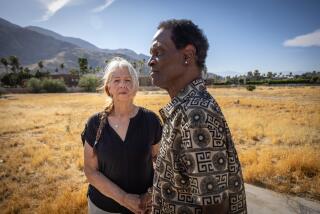Driving Miss Odessa : COMMENTARY : Bus Boycott: The Way It Really Was
- Share via
Like 1988’s “Mississippi Burning,” this year’s “The Long Walk Home” is another case of Hollywood’s telling it like it wasn’t about the struggle by blacks to throw off the cruel shackles of the Southern segregation system.
“Mississippi Burning” was a grievously distorted version of the 1964 assassination of three civil-rights workers in Philadelphia, Miss. “The Long Walk Home” is a grossly misleading and sentimentalized sugar-coated version of the 1955 Montgomery Bus Boycott.
That Hollywood, in its latest mini-fad, is at last paying some attention to the civil rights struggle is a good thing. The problem--or my problem, anyway--with these movies is that they are being presented as somewhat fictionalized but historically accurate versions of actual events.
“The Long Walk Home” purports to tell us what happens in rigidly segregated Montgomery (“the cradle of the Confederacy”) when one white upper-class Country Club housewife/mother-of-two, Mrs. Norman Thompson (Sissy Spacek), undergoes a 180-degree moral turnaround that begins when her longtime maid, Odessa (Whoopi Goldberg) is called “nigger” and is run out of a white park where she’s been deposited to baby-sit the Thompson children.
Mrs. Thompson uses her political clout and social position to force the abusive cop to apologize to her and the maid, which he does, even addressing the maid as “Mrs. Cotter.” That a white Southern cop, or any white person, for that matter, would apologize to any black person for anything--even a killing or lynching--was extremely unlikely in that era. And to address a black woman as “Mrs.”? As Gov. George Wallace would have put it, that would have been as likely as finding socks on a rooster.
The North Carolina newspaper where I cut my teeth as a reporter in the ‘50s would have gotten around the “Mrs.” problem--as would have other papers--in this case by calling the maid “Odessa Cotter” in the first paragraph and “the Cotter woman” thereafter.
When in this movie the bus boycott begins (we hear Martin Luther King Jr.’s eloquent call to arms from inside the SRO church while Odessa and her family stand in a crowd outside), Mrs. Thompson’s husband walks out, and she is suddenly isolated with her two little girls.
But instead of caving in, she pluckily turns her back on security, tradition, upbringing and social acceptance and actually joins the boycott by using the family station wagon to car-pool black workers around Montgomery--even putting them in the front seat with her. At movie’s end, we see a threatened Mrs. Thompson and Odessa holding hands and silencing and facing down a raving mob of whites with only the quiet strength and dignity of their moral superiority.
Could anything like this have actually happened in the South during the ‘50s or ‘60s? Utterly and completely impossible.
In all of my years of coming of age as a reporter in my native South in the ‘50s, and covering all of the major civil-rights stories for Newsweek in the ‘60s, I knew of only a very, very rare upper-class Southern white woman who spoke out even tentatively against the brutalities and inequities visited on black people. Marching? Protesting? Holding hands, or even meeting with blacks? Boycotting? Not a chance.
It wasn’t that all Southern white women--or all white men--were deep-dyed racists. But the intimidation--the spoken and unspoken threat of cross-burnings, beatings, burnings, social ostracization, loss of money and position--was too great and too all-pervasive. As Martin Luther King Jr. often pointed out, whites were as much victims of the system of segregation as blacks--though certainly not so brutally used by it.
So to present in a movie that a well-meaning white woman and her rather passive maid could actually defeat a white mob and score a major triumph against segregation is about as far from reality as one could get.
Well, so what to these Hollywood variations from what actually happens? What’s the big deal, as long as the evils of segregation are illuminated in a compelling drama (which, by the way, this is not)?
Well, whole new generations of young people are being introduced to these important American historical events for the first time through movies. And what is the main message conveyed to these virgin minds by both “Mississippi Burning” and “The Long Walk Home”?
The main message, in both pictures, is that white people are the heroes, that blacks were only background players. “Mississippi Burning” was about two heroic FBI agents, when in fact the FBI’s role was anything but heroic, a mere delivering of a $30,000 bribe to an informer. In “The Long Walk Home,” a white woman is the central heroic figure, when in fact it was only the bravery and the bloodshed of black people in Montgomery that broke bus segregation and launched a bloody 10-year struggle that eventually overcame, at the cost of dozens of black lives, the meaner aspects of segregation in the South.
That’s the trouble with “The Long Walk Home. It just sends black people, one more time, to the back of the bus.
More to Read
Only good movies
Get the Indie Focus newsletter, Mark Olsen's weekly guide to the world of cinema.
You may occasionally receive promotional content from the Los Angeles Times.









